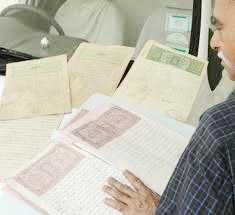Urban Property Ownership Record will Curb Land-related frauds
Urban Property Ownership Records will help to pull out records of all the unaccounted properties in Bangalore and make it mandatory for property owners to pay taxes for their property.
 Many people who seek bank loans to buy property in India are unaware of the fact that the property that they buy might have a stay order by the government. To make matters worse, even the sub-registrar is unaware of the exact number of registered properties in the city. Bangalore and many other cities in Karnataka have for long been facing problems pertaining to properties that are not in the account of the government agencies and for which people do not pay taxes.
Many people who seek bank loans to buy property in India are unaware of the fact that the property that they buy might have a stay order by the government. To make matters worse, even the sub-registrar is unaware of the exact number of registered properties in the city. Bangalore and many other cities in Karnataka have for long been facing problems pertaining to properties that are not in the account of the government agencies and for which people do not pay taxes.
Taking this into account and to curb this issue, the government of Karnataka recently initiated the Urban Property Ownership Record (UPOR) programme which will help them pull out records of all the unaccounted properties in Bangalore city and make it mandatory for everyone to pay taxes for their properties.
UPOR Karnataka to trace encroachments and property tax evasion
 This programme has been implemented in Bangalore after its success in Shimoga, Mysore, Bellary and Hubli-Dharwad. Currently there are 16 lakh properties in Bangalore that are accounted for and another 5 lakh properties which are not accounted for in the government records.
This programme has been implemented in Bangalore after its success in Shimoga, Mysore, Bellary and Hubli-Dharwad. Currently there are 16 lakh properties in Bangalore that are accounted for and another 5 lakh properties which are not accounted for in the government records.
The project has helped in identifying around 16.19 lakh properties in the city which will consequently be brought under the tax payment act. The project details of all the properties will be disclosed on a public platform which will further serve the government for various other purposes like marking of water and sewerage lines.
Apparently the police can also make use of this project by identifying crimes and the BBMP Bangalore can use it to map the assets and the issue of licences for optic fibre cables.
Currently the scheme will be initiated in 50 BBMP wards of the city consisting of 4 lakh properties. This scheme will be implemented through a public-private partnership model. The cost of the project is 9.48 crore rupees and the state government is providing 4.74 crore rupees.
 In order to carry on with this project, the initial step would be to have a property identification (PID) number for every property in Bangalore. The unique PID will be issued by the Bruhat Bangalore Mahanagara Palike (BBMP).
In order to carry on with this project, the initial step would be to have a property identification (PID) number for every property in Bangalore. The unique PID will be issued by the Bruhat Bangalore Mahanagara Palike (BBMP).
It is estimated that in the upcoming years the project will help the BBMP collect about 3, 000 crore rupees in the form of property tax. It is expected that the PID will later be assimilated with the State Revenue Department’s Urban Property Ownership Record (UPOR) which will be implemented all over the state. The UPOR helped the government identify about 1.76 lakh properties, whereas the number of tax payers were just 1.2 lakh.
To make it even more convenient, the BBMP launched the geographical information system (GIS)-based PID which helped the civic body collect 1,200 crore rupees out of 11 lakh properties. This will also help the BBMP identify and map the slum areas and the government properties. Further, the PID will result in an increased collection of revenue by the BBMP and will result in transparency as well. A nominal fee will be charged to get a PID for your property, and bring it into record or to get a record upgradation.
PID characteristics in detail
- The PID was issued to every citizen of Bangalore on January 2011.
- Issuing of PID will make the work of estimating and collecting property tax in Bangalore very swift and trouble-free.
- PID will have a person’s ward number, street number and the door number of their property. It will be unique for every property.
- An individual can get the PID number on the website and will also get information on their property details.
- PID s will also be Geo tagged with the exact spacial dimension of your property and will also have the latest photograph of your house.
- PID will create a stable property record and all the transactions of every property. This will perhaps help in recording and serving evidence of property ownership for all the legal purposes.
- PIDs can be used for property registrations and in bank transactions for loans.
Henceforth this contemporary initiation by the government is hoped to get some changes in property frauds and create excessive revenues by making people pay the approximate amount.







